

Mindfulness: What’s the POINT? The brain loves to chunk information in order to remember things and there are so many great acronyms that help us remember to bring mindfulness into our lives.
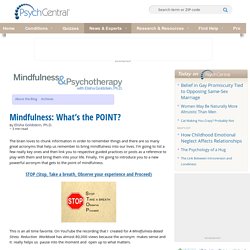
I’m going to list a few really key ones and then link you to respective guided practices or posts as a reference to play with them and bring them into your life. Finally, I’m going to introduce you to a new powerful acronym that gets to the point of mindfulness. STOP (Stop, Take a breath, Observe your experience and Proceed) This is an all time favorite. On YouTube the recording that I created for A Mindfulness-Based Stress Reduction Workbook has almost 80,000 views because the acronym makes sense and it really helps us pause into the moment and open up to what matters. RAIN (Recognize, Allow, Inquire, Non-identify/Natural Awareness) This acronym created by Michelle McDonald and popularized and adapted by Tara Brach, is incredible for helping us gain perspective, self-compassion and confidence with our difficult feelings.
Warmly, RAIN: A Mindfulness Practice for Welcoming Your Emotions. Beyond Hacking Your Habits. The essence of mindfulness is training the mind to recognize unconscious reactions, so that we may move out of autopilot and into more adaptive responding.
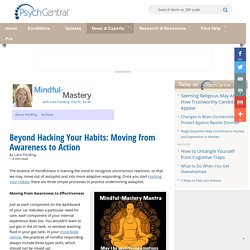
Once you start Hacking Your Habits, there are three simple processes to practice undermining autopilot. Mindful-Mastery Mantra Moving from Awareness to Effectiveness Just as each component on the dashboard of your car indicates a particular need for care, each component of your internal experience does too. 12 Indispensable Mindful Living Tools. By Leo Babauta The focus of my life in recent months has been living mindfully, and while I don’t always remember to do that, I have learned a few things worth sharing.
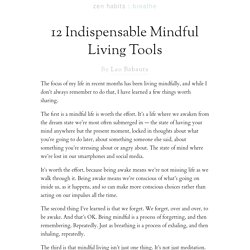
The first is a mindful life is worth the effort. It’s a life where we awaken from the dream state we’re most often submerged in — the state of having your mind anywhere but the present moment, locked in thoughts about what you’re going to do later, about something someone else said, about something you’re stressing about or angry about. The state of mind where we’re lost in our smartphones and social media. It’s worth the effort, because being awake means we’re not missing life as we walk through it. The second thing I’ve learned is that we forget. The third is that mindful living isn’t just one thing.
How To Make Your Mind Happy: 5 Secrets To Mindfulness. Sometimes it seems like your brain just sits around creating lousy feelings and worries.
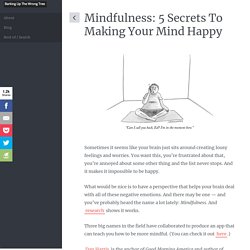
You want this, you’re frustrated about that, you’re annoyed about some other thing and the list never stops. And it makes it impossible to be happy. What would be nice is to have a perspective that helps your brain deal with all of these negative emotions. And there may be one — and you’ve probably heard the name a lot lately: Mindfulness. And research shows it works. Three big names in the field have collaborated to produce an app that can teach you how to be more mindful. Dan Harris is the anchor of Good Morning America and author of 10% Happier, where he recounts his journey from mindfulness skeptic to believer.
Mindfulness-Based Cognitive Therapy (MBCT) Mindful Procrastination. Mindful Emotion Regulation. Mindful Kids. Meditation for Beginners: 20 Practical Tips for Understanding the Mind. By Leo Babauta The most important habit I’ve formed in the last 10 years of forming habits is meditation.
Hands down, bar none. Meditation has helped me to form all my other habits, it’s helped me to become more peaceful, more focused, less worried about discomfort, more appreciative and attentive to everything in my life. I’m far from perfect, but it has helped me come a long way. Probably most importantly, it has helped me understand my own mind. So … I highly recommend this habit. These tips aren’t aimed at helping you to become an expert … they should help you get started and keep going. Sit for just two minutes. The Daily Chore That Can Increase Mental Stimulation and Decrease Anxiety. When done properly, the chore decreased nervousness by 27% and increased mental inspiration by 25%.
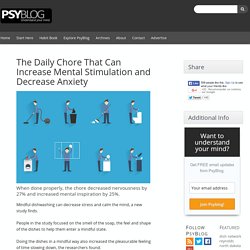
Mindful dishwashing can decrease stress and calm the mind, a new study finds. People in the study focused on the smell of the soap, the feel and shape of the dishes to help them enter a mindful state. Doing the dishes in a mindful way also increased the pleasurable feeling of time slowing down, the researchers found. Mr Adam Hanley, the study’s first author, said: “I’ve had an interest in mindfulness for many years, both as a contemplative practitioner and a researcher.I was particularly interested in how the mundane activities in life could be used to promote a mindful state and, thus, increase overall sense of well-being.” In the study 51 people were split into two groups.
One group did the dishes in their normal way — most likely while letting their minds wander to the usual anxieties. The other group were encouraged to focus on the sensory experience of washing the dishes. Top 20 Mindfulness Apps For Meditation, Eating & Awareness (+ Reviews) Mindfulness. Positive Psychology.